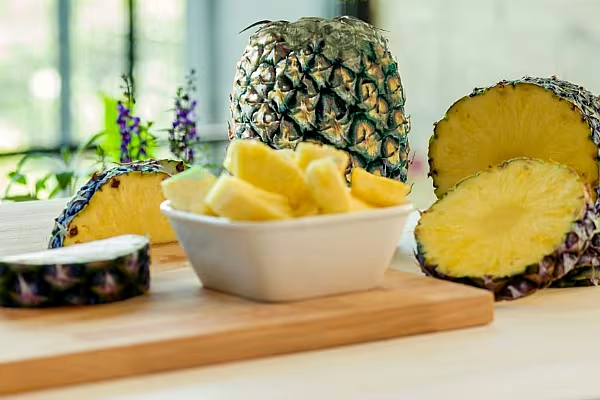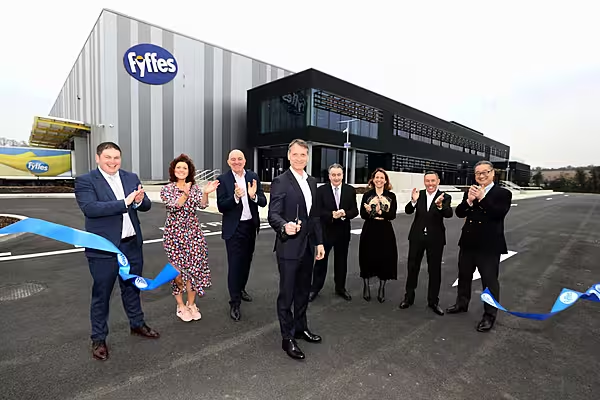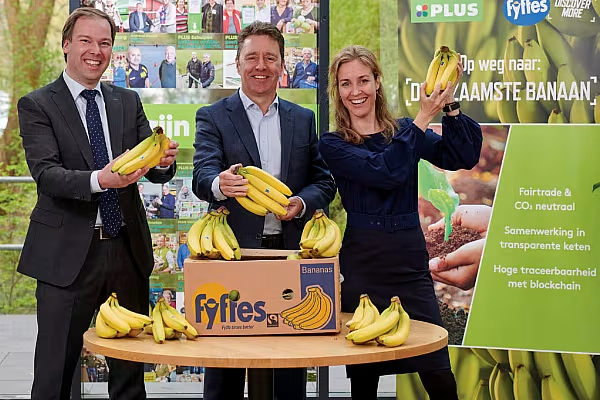Helge Sparsoe, chief executive of Fyffes, talks to Stephen Wynne-Jones about the company’s bold repositioning and brand ambitions. This article appeared in ESM's September/October 2024 edition.
Fyffes has been a global powerhouse in the banana segment for generations, with a heritage that dates back to the latter part of the nineteenth century, but under chief executive Helge Sparsoe, the company is seeking to position itself as a disruptor in an otherwise commoditised category.
In October 2023, Fyffes launched Trudi’s, a new brand for the European fruit market that seeks to tap into consumer demand for responsibly sourced products while imbuing some added value into the tropical-fruit segment. The first new brand to be launched by Fyffes in decades, Trudi’s is currently being earmarked for roll-out early next year.
Three-Pillar Process
The development of Trudi’s hasn’t come out of thin air – rather, it’s the culmination of several years’ worth of activity at Fyffes, instigated by Sparsoe’s appointment as chief executive in 2020.
“It’s never easy to come into the role of CEO after the previous CEO has been in place for 35 years,” the Danish native tells ESM, referring to the long tenure of his predecessor, David McCann, “so that in itself is a huge challenge.”
Despite the immediate obstacles presented by the COVID-19 pandemic and associated supply chain challenges, Sparsoe set to work implementing a three-pillar process to reinvigorate the long-standing business and position it better for a rapidly changing future.
The first pillar, Operational and Organisational Excellence, was instigated in 2021 and sought to streamline Fyffes’ global operations by unifying systems and processes across the various regions in which the firm does business, ensuring efficiency and consistency. For a business that has grown over the years through a myriad of global acquisitions – and itself was acquired by the Tokyo-based conglomerate Sumitomo Corporation in 2016 – this wasn’t an easy task.
“We started by setting a vision for ourselves, in terms of what kind of company we wanted to be and ‘What kind of role do we want to play within the world in which we operate?’,” says Sparsoe. “That’s how we came up with our new mantra, ‘shaping wellbeing for the world.’
“First, though, we needed to get our own house in order. When I jumped on calls during the pandemic and talked to people in different markets – Germany, the UK, Ireland, or the US – it was like talking to four different companies – four different visions, four different things that they wanted to achieve, and four different ways of getting there.”
Sparsoe and his team set about consolidating these different approaches to create “one system, one set of data, and one truth,” as he puts it – a process that took approximately two years.
“It was a case of still respecting the uniqueness of each of our set-ups, but bringing a common agenda, a common strategy, and a common vision that allows us to get more integrated as a company and work towards one target, one goal.”
This was followed by a second pillar, Consumer at Heart, which, over the course of 2023, gathered insights from more than 13,000 consumers in eight markets, as well as from the retailers that stock Fyffes’ products. According to Sparsoe, it has long been essential for Fyffes to maintain strong relationships with its stakeholders, and even more so in an industry in constant flux.
“We were brutally honest with ourselves when we started this process, in terms of deciding that we weren’t going to speculate any more – if there’s something we don’t know about ourselves, we’re going to go and find out,” he says.
“The company has been around for 136 years, and sometimes the biggest hurdle you need to overcome is moving from a situation where you think you know everything to asking yourself some hard questions, but in addition to that, we also wanted to understand the market we now operate in. Things have changed. Evolution, technology and AI and development is at a higher pace right now than at any point in the last five, ten years – maybe longer. We need to be part of that journey.”
The completion of the first and second pillars has led to the implementation of a third, Groundbreaking Innovation, under which Fyffes is committed to integrating new technologies and agricultural practices to drive future growth, ensuring that it balances financial reward with environmental and sustainable targets.
“We’re going to start working on a lot of the things we’ve been working up for the last three years,” says Sparsoe. “That also incorporates our sustainability and human rights agenda. This is now a very integrated part of who we are and how we conduct our business, and [it] is also aligned with the agenda of our retailers. So, for me, it’s a mutual agenda that we need to align on.”
Seeking Differentiation
Trudi’s is the most significant outcome from this process, with the brand seeking to differentiate itself in a crowded market by offering high-quality, responsibly sourced fruit that appeals to environmentally conscious consumers.
“We’re trying to change the perception of how we want to interact as a long-term, sustainable, reliable supplier,” as Sparsoe puts it.
As he explains, most consumers approach the banana category without giving it much thought, despite having a broad understanding of the inherent benefits that the product contains.
“The category is basically running on autopilot,” says Sparsoe. “If you look at your fruit basket, and you’re out of bananas, you put bananas on your shopping list. You go to your store, you go to the fruit-and-vegetable department, and you decide how many bananas you need. You put them in your basket and go home. You don’t really think about it.”
As Fyffes’ consumer survey found, shoppers already have a high regard for bananas for their health-and-wellness properties – a positive affirmation that was accelerated by COVID-19. It also found that where shoppers have less money to spend, most are less likely to sacrifice these so-called ‘better for you’ products, and therefore remain committed, despite their constrained circumstances. It’s this loyalty that Fyffes is seeking to harness, justifying the added value that consumers have with the product.
“I believe that we can bring excitement to the category by enticing more traffic, more consumption, and, therefore, at the end of the day, more sales,” says Sparsoe. “Ideally, we can also bring a premium to the category because we’re bringing something that is going to create a point of difference, compared to other categories out there.”
As regards brand voice, Trudi’s will seek to convey a message of health and wellness, sustainability, and community impact, incorporating greater investment in job security and opportunity (particularly for women), education, and nutrition initiatives in the countries where its products are sourced.
“You don’t need to tell people that eating bananas is good for you,” says Sparsoe. “They already know that. Where we can add more value is in the knowledge that, when you buy a Trudi’s banana, that purchase is being reinvested into the communities it is sourced from.”
What’s In A Name?
While the Fyffes name harks back to Edward Wathen Fyffe, the entrepreneur who first imported bananas into the UK in the late nineteenth century, Trudi’s doesn’t have a historical reference point. Rather, it has been selected to convey the brand’s proactive stance, reflecting both its championing of female empowerment and the positive messaging that the brand seeks to convey.
“There’s a joyfulness about it,” says Sparsoe.
The timing of the launch – and indeed of the comprehensive consumer survey undertaken by Fyffes – is notable, as shoppers are still feeling the pinch, and inflation concerns, while easing, haven’t dissipated. Thus, Fyffes is taking its time with Trudi’s, ensuring that it finds the right balance of value and values, of price and positive social impact.
Initially unveiled at Fruit Attraction in Madrid and Fruit Logistica in Berlin, to raise perception among key stakeholders, the brand will be introduced to select retailers in 2025, expanding gradually as awareness grows.
Sparsoe admits that changing the perception of bananas from a low-priced commodity to an added-value product carries some risk, but he believes that the time is right to change customer perceptions around the category. Promotional messaging for Trudi’s to date has included ‘Nothing tastes better than knowing your fruit is doing good,’ and ‘Our bananas aren’t cheap,’ advocating the added-value message.
“Of course there’s an overall disposable-income challenge, where a consumer only has X amount to spend on their weekly shop,” says Sparsoe, “so how do you drive premium within that? For me, price and value are always linked together, and that’s the agenda we’re working on.
“With Trudi’s, we’re seeking to bring something that builds on the basics that we’re already very good at, and builds in consistent quality and a message that consumers can understand. You’ve seen brand-building in the apple and orange categories, which indicates that people are willing to pay a premium if there is something that fulfils their needs, but, at the same time, you can never achieve anything without understanding your consumers, regardless of what it is.”
The company is also in it for the long haul. It expects to see Trudi’s start to gain traction during 2025 and 2026, before doubling down on innovation and marketing over the remainder of the decade.
Sparsoe’s background – he previously headed up Diageo’s Nordic operations, as well as holding senior positions with Chiquita and Unilever – indicates that he understands the importance of brand differentiation. To this end, the company also recently appointed a new chief commercial officer, Frank Burkhardt – a former chief marketing officer at L’Oréal and commercial director for Europe at P&G – to oversee its ambitious expansion.
“All brands have to start somewhere,” Sparsoe explains. “Even Coca-Cola was new to the market at some point in time. So, yes, we know this is going to take time. This is not about a big splash, going in, and then disappearing in a few years. This is about setting the agenda for how we want to operate and how we want to be seen as a supplier.
“In order to do that, you have to have the right people and you have to put investments and resources behind it. Once it gets off the ground, people will go, ‘Great, what’s next?’ We have built an extensive pipeline of activities and launches for the future. Once we start that journey, we need to constantly look at ways that we can continuously improve our brand proposition.”
Sustainable Standpoint
The banana industry has long been in the spotlight over its sustainability credentials – something that Fyffes has sought to tackle head-on under Sparsoe’s leadership.
In 2021, it launched its first-ever sustainability report, outlining 13 sustainability targets aligned with the UN Sustainable Development Goals, and followed that up the same year and every year since with its first human rights report, turning the spotlight on its efforts to mitigate human rights abuses, child labour, and health-and-safety issues in its supply chains.
Fyffes’ second sustainability report, published in September 2023, indicated the level to which it is making progress, in areas such as GHG emissions reduction, repurposing waste from production processes, and supporting and enriching communities.
“We could have waited until we got a lot of things in place, but we decided to do the opposite,” says Sparsoe. “We decided to tell people exactly where we are. We have lots of work to do, but we wanted to be very honest and truthful in terms of exactly where we are, what we need to address, and how we’re going to go about it.”
Among the positives, according to Sparsoe, are a 10% reduction in Scope 3 emissions, as well as a near-total adoption of sustainable packaging – just over 98% of its packaging is now made with reusable or compostable materials. In terms of workplace safety and water consumption, the company has made significant strides, while it has also donated the equivalent of more than 20 million meals from produce that didn’t meet retail standards – far above the initial five-million target. Trudi’s, once launched, will help to convey these positive achievements and further the company’s sustainability efforts.
“At the end of the day, it’s driven by the managers, the people within the organisation – by ‘good leaders doing good’,” Sparsoe adds. “It’s that simple. If you don’t adhere by the values we have, or you don’t think that’s important, then Fyffes is not the place for you.”
The net result is the emergence of a business that may have many decades of trading under its belt, but it is as eager and emboldened as a new market entrant – a 136-year-old start-up, you might say.














